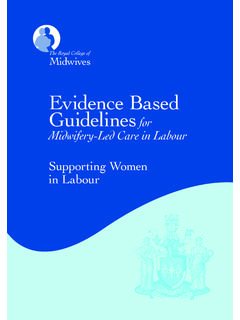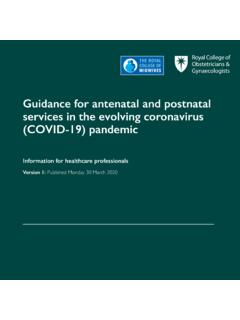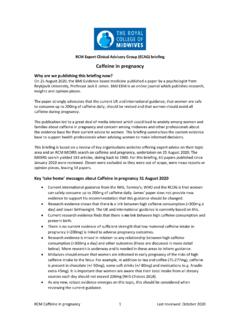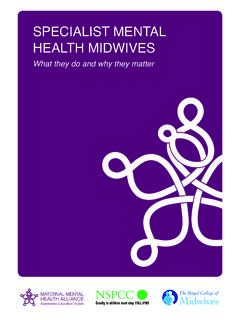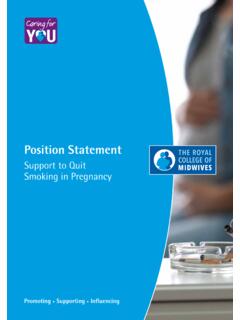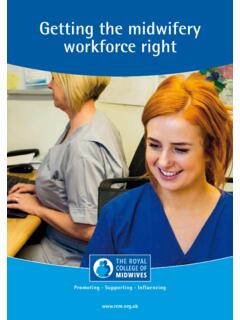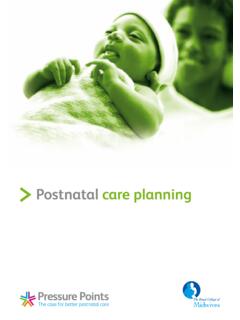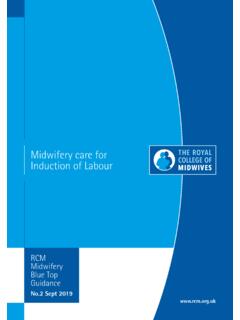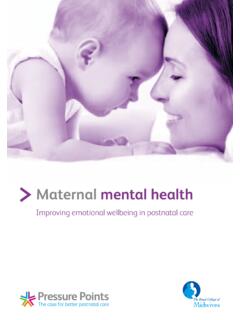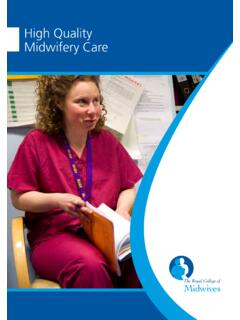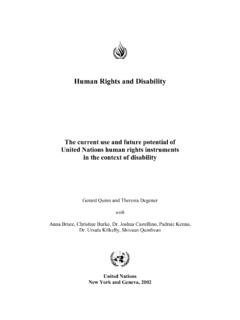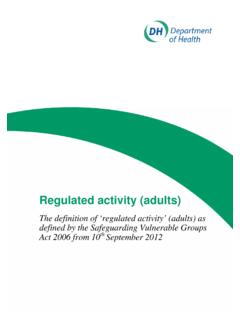Transcription of Work, Health and Emotional Lives of Midwives in the …
1 work , Health and Emotional Lives of Midwives in the United Kingdom: The UK WHELM study School of Healthcare Sciences Cardiff University Project commissioned by: This research was commissioned by the Royal College of Midwives (RCM), and is a collaboration between Cardiff University and Griffith University, Queensland Australia. Research team: UK Team: Professor Billie Hunter, RCM Professor of Midwifery, School of Healthcare Sciences, Cardiff University, Wales UK. Dr Josie Henley, Research Associate, School of Healthcare Sciences, Cardiff University, Wales UK. Australian Team: Professor Jennifer Fenwick, Griffith University and Gold Coast University Hospital, School of Nursing and Midwifery Queensland Australia Associate Professor Mary Sidebotham, Griffith University, School of Nursing and Midwifery Queensland Australia Adjunct Associate Professor, Dr Julie Pallant Griffith University, Queensland Australia Corresponding author: Professor Billie Hunter Email: School of Healthcare Sciences Cardiff University Eastgate House 35-43 Newport Road Cardiff CF24 0AB.
2 Acknowledgements: Our sincere thanks to all the Midwives who gave freely of their time to participate in this study. We would also like to thank the Midwives who piloted the UK. version of the WHELM tool, and the team at RCM who supported publicising and disseminating the survey to RCM members (in particular Gill Adgie, Tamara Dale, Paulette Boniface, Amy Leversidge, Emma Godfrey-Edwards). Finally, we wish to thank Louise Silverton for her commitment and support for the project throughout its various stages. 2. EXECUTIVE SUMMARY. Background: There is growing evidence that high levels of Emotional distress in the midwifery workforce contribute to low morale and attrition. There is a chronic shortage of Midwives in England partly attributable to difficulties with staff retention. There are similar concerns noted in relation to the midwifery workforce in other high income countries. It is important to find out more about the characteristics of the midwifery workforce and working environment that may contribute to Emotional distress and ill Health , so that possible solutions can be identified.
3 With this aim in mind the Royal College of Midwives (RCM) commissioned the work , Health and Emotional Lives of Midwives (WHELM) study for the United Kingdom (UK). The study builds on the Caring for You' campaign and contributes to the evidence base on how best to support and sustain the midwifery workforce. Aim: The aim of the study was to explore the relationship between the Emotional wellbeing of UK Midwives and their work environment, using a cross sectional research design. Methods: An on-line survey was distributed via the RCM to all full midwife members in 2017 (n= 31,898). The WHELM survey tool was conceived within the Australian maternity context and to date has been conducted in Australia, New Zealand, Sweden, Canada and Norway. The survey tool consisted of a number of validated measures: The Copenhagen Burnout Inventory (CBI), Depression, Anxiety and Stress Scale (DASS-21), The Perceptions of Empowerment in Midwifery Scale (PEMS: Revised), and the Practice Environment Scale (PES: Midwives ).
4 The survey also included items from the RCM Why Midwives Leave' study (Ball et al., 2002). Demographic questions were modified for the UK context and pilot tested. Key Results: Just under 2000 Midwives responded to the survey (n=1997). This represents 16% of the RCM membership. The key results were very concerning and indicate that the UK's midwifery workforce is experiencing significant levels of Emotional distress. 3. High levels of burnout 83% of participants were suffering from personal burnout and 67% were experiencing work - related burnout. Client-related burnout was low at The personal and work related burnout scores were well above population norms as well as higher than the results from other WHELM collaborating countries. High levels of stress, anxiety and depression. Over one third of participants scored in the moderate/severe/extreme range for stress ( ) anxiety (38%) and depression (33%). This was well above population norms and those of other WHELM countries.
5 Factors associated with high levels of burnout, depression, anxiety and stress. Younger Midwives ( Midwives aged 40 and below). Midwives with a disability Midwives with less than 30 years' experience Clinical Midwives , particularly those working rotation in hospital and in integrated hospital/community settings. Perceptions of low levels of resource adequacy was the strongest predictor of work - related burnout Perceived low levels of management support, professional recognition and opportunities for development also contributed to burnout, depression, anxiety and stress. High numbers of Midwives intending to leave the profession of participants stated they had thought about leaving the profession within the last six months. The two top reasons were: Dissatisfaction with staffing levels at work ' (60%). and Dissatisfaction with the quality of care I was able to provide' (52%). Midwives intending to leave had significantly higher levels of burnout, anxiety, stress and depression than those who had not considered leaving.
6 Key Recommendations Lobby for systems level changes in the resourcing and provision of maternity care throughout the UK. 4. Increase pressure on government to address issues of workforce shortages, with a new focus on retention of recent graduates rather than merely increasing student numbers. Introduce evidence-based interventions for workforce support and ensure that Midwives are given protected' time to attend. Provide proactive support for younger, recently qualified Midwives , a group identified as being particularly at risk of Emotional compromise. Focus support on their key identified needs, to promote workforce sustainability. Provide proactive support for Midwives with a disability to support their Emotional wellbeing. Ensure that all managers receive high quality management and leadership training appropriate for the context and challenges of UK maternity care, and underpinned by a supportive, empowering and collaborative approach to leadership. Facilitate a sense of shared leadership amongst Midwives at a team level, for example engaging clinical Midwives in discussions about how to improve care.
7 Seek opportunities for optimising Midwives ' sense of agency. Update the evidence base relating to midwifery managers' experiences by undertaking research into their Emotional wellbeing and needs. 5. INTRODUCTION. Workforce wellbeing is a key concern for the Royal College of Midwives (RCM), as evident in their Caring for You campaign There is growing evidence that high levels of Emotional distress contribute to low morale and midwifery attrition (Ball et al., 2002; RCM, 2016a; RCM, 2016b; Sheen et al., 2015; Yoshida & Sandall, 2013). There is a chronic shortage of Midwives in England (Warwick, 2017), partly attributable to difficulties with staff retention. In 2016 two membership surveys were conducted by RCM: the Caring for You Survey (RCM, 2016a), and the Why Midwives Leave Survey (RCM, 2016b). Findings from both surveys identified important concerns in relation to Midwives ' workplace stress and low morale, but left many questions unanswered. As a response, RCM commissioned the United Kingdom arm of the work Health and Emotional Lives of Midwives ' (WHELM) study to provide stronger scientific evidence about workforce wellbeing and the factors that influence this.
8 The College considered it was important to find out more about the characteristics of midwifery work that may contribute to workplace stress, so that possible solutions can be identified. The key study aim was to explore the relationship between the Emotional wellbeing of Midwives and the work environment, within the context of UK maternity care. The working hypothesis was that work related variables may be associated with Emotional distress in Midwives . The UK WHELM study contributes to a broad programme of RCM work seeking to develop and implement strategies to better support the midwifery workforce, and ultimately improve the quality of care provided to women and families. WHELM studies have already been undertaken in Australia, New Zealand, Sweden, Canada and Norway with additional arms planned for Germany, Lithuania and ireland . Participating in the WHELM collaboration also provides opportunities for future cross-cultural comparisons, facilitating rich insights into the wellbeing of the international midwifery workforce.
9 Background Attending to the Emotional wellbeing of individual Midwives is increasingly recognised as an important strategy in retaining Midwives within the profession and maintaining a healthy midwifery workforce (RCM, 2016a). However, there has been limited research attention 6. paid to the Emotional needs and experiences of Midwives as a factor in retention and workplace Health . Midwives care for women and their families during an emotionally demanding time. Although pregnancy and birth is a mostly joyful experience, this is not always the case. Even when caring for women with straightforward pregnancies, Midwives may have to support women experiencing anxiety and pain. They also may experience vicarious secondary trauma when caring for women who experience adverse situations such as pregnancy complications and loss of their baby (Leinweber & Rowe, 2010; Rice & Warland, 2013). Midwifery work is intrinsically emotionally demanding, and it has been argued that the extensive emotion work ' that this creates for Midwives is largely unrecognised and undervalued (Hunter, 2010).
10 The current evidence indicates a range of organisational and professional factors that create workplace adversity for Midwives and may compromise their Emotional wellbeing. These include shift working, heavy workload, bullying, poor quality support and staff shortages (Ball et al., 2002, Mollart et al., 2013; RCM, 2016a, 2016b). Over a decade ago, an extensive study of why UK Midwives leave or stay in practice showed that high levels of stress or workplace adversity in midwifery were widespread and associated with both physical and mental ill- Health , increased rates of sickness and poor staff retention, (Ball et al., 2002;. Kirkham et al., 2006). The study of why Midwives leave has recently been replicated (RCM, 2016b), and shows that the situation has not improved. Moreover, the context of UK. maternity care has become more demanding for Midwives : the birth rate has risen by nearly 20% since 2002, women accessing maternity services have increasingly complex care needs (RCM, 2016b), and a persistent shortage of Midwives exists (estimated by RCM to be a shortage of 3,500 posts in England alone, RCM 2017).
